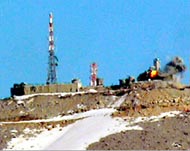Sharon rules out Golan withdrawal
Israeli Prime Minister Ariel Sharon has warned MPs that negotiations with Syria will ultimately lead to a withdrawal from the Israeli occupied Syrian Golan Heights.

MPs interpreted his comments as meaning that Sharon was ruling out an early resumption of peace negotiations that broke off in 2000 during the Shepherdstown talks over the fate of the Golan, Israeli radio reported on Monday.
“It’s important to know that at the end of negotiations with Syria, Israel would have to leave the Golan Heights,” an unnamed parliamentary source quoted Sharon as saying at a Monday meeting of parliament’s foreign affairs and defence committee.
“Apparently Sharon was speaking about the end of negotiations with Syria in order to ensure that such talks don’t even start,” opposition leader and Labour party chief Shimon Peres told public radio.
Sharon rejects withdrawal from the Golan Heights, a strategic plateau Israel occupied during the 1967 Arab-Israeli war. It later annexed the water-rich area, a move not recognised by the international community.
Where to resume
Israel has responded sceptically to recent peace overtures from Damascus, saying Syria would have to first curtail all support for Palestinian and Lebanese resistance groups.
Last week Damascus dismissed an invitation by Israeli President Moshe Katsav to his Syrian counterpart Bashar al-Asad for peace talks in Jerusalem as a media stunt.
 |
|
Hizb Allah has attacked Israeli |
Israel demands that the peace track with Syria should start without preconditions, whereas Damascus wants to pick up where they stopped four years ago.
Former US President Bill Clinton mediated the Shepherdstown talks, between the late Syrian leader Hafidh al-Asad and former Israeli Prime Minister Ehud Barak.
These negotiations ended without an agreement on the fate of the Golan Heights overlooking the Sea of Galilee, Israel’s biggest reservoir.
Syrian olive branch
In related news, al-Asad has said Damascus has not and will not have any secret contacts with Israel, but is open to any initiative that will return to Syria its occupied territory.
“Why would we negotiate in secret? A country does not negotiate in secret unless it wants to hide something from its people,” al-Asad said in an interview with the London-based al-Sharq al-Awsat newspaper on Monday.
“In our case, the Syrian people are with peace, so if we wanted to negotiate why wouldn’t we negotiate openly?” he asked.
|
“From the beginning and until this moment, the US administration did not wish to throw itself into the peace process. As for Sharon … it is hard for him to succeed on a peace platform” |
His comments were the first from the Syrian leader since Israeli Foreign Minister Silvan Shalom said earlier this month Israel had secret contacts with Syria several months ago.
Shalom claimed they broke down after word of the meetings leaked out. Syrian officials denied any secret contacts had taken place.
Al-Asad said such Israeli reports were intended to cause confusion.
Difficult times
Al-Asad appeared pessimistic about chances for resuming peace talks under Sharon and said the current US administration was not interested in sponsoring such talks.
“From the beginning and until this moment, the US administration did not wish to throw itself into the peace process. As for Sharon… it is hard for him to succeed on a peace platform,” he said.
In the same interview, al-Asad reiterated calls for Israel to abandon its nuclear arsenal before Arab states can be asked to give up alleged weapons programmes.
He again stopped short of denying that Damascus possessed any weapons of mass destruction. Washington has threatened political and economic sanctions against Syria for allegedly developing chemical, biological and nuclear arms.
Israel refuses to confirm or deny whether it has nuclear weapons. But its staunch ally Washington has considered it to be a nuclear power since 1969 and experts estimate it has 200 nuclear warheads.